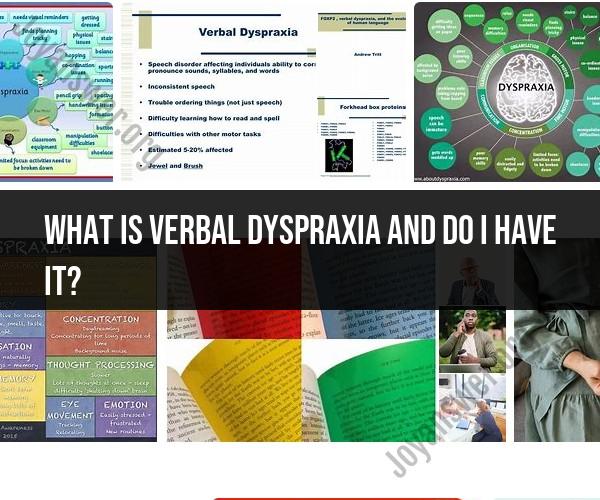What is verbal dyspraxia and do I have it?
Verbal dyspraxia, also known as childhood apraxia of speech (CAS), is a neurological speech disorder that affects a person's ability to plan and coordinate the movements necessary for speech. It primarily occurs in children, and its exact cause is not always known, although it's believed to have a neurological basis.
Here are some key characteristics of verbal dyspraxia:
Speech Sound Errors: Children with verbal dyspraxia have difficulty producing speech sounds accurately. They may substitute, omit, or distort sounds in words, making their speech difficult to understand.
Inconsistent Errors: One notable feature of CAS is that the speech errors tend to be inconsistent. The same word may be pronounced differently on different occasions.
Difficulty with Sequencing: Children with CAS struggle to plan and sequence the movements needed for speech. They may have trouble coordinating the timing and placement of their articulators (tongue, lips, etc.) to form words correctly.
Effortful Speech: Speaking can be a laborious process for individuals with verbal dyspraxia. They may exert a lot of effort to produce even simple words.
Language Comprehension: It's important to note that CAS primarily affects speech production, not language comprehension or cognitive abilities. Children with CAS often understand language at a level appropriate for their age.
Diagnosing verbal dyspraxia typically involves a speech-language pathologist (SLP) who specializes in assessing and treating speech disorders. If you suspect that you or your child may have verbal dyspraxia, it's essential to consult with a qualified SLP for a comprehensive evaluation.
Treatment for verbal dyspraxia typically involves speech therapy with a focus on improving speech sound production, motor planning, and coordination. Early intervention is crucial for better outcomes.
Remember that only a qualified healthcare professional can provide a definitive diagnosis and develop an appropriate treatment plan. If you have concerns about verbal dyspraxia, it's best to seek a professional evaluation and guidance.
Verbal Dyspraxia: Understanding the Condition and Its Implications
Verbal dyspraxia, also known as childhood apraxia of speech (CAS), is a motor speech disorder that affects a child's ability to coordinate the muscles used for speech. Children with verbal dyspraxia know what they want to say, but they have difficulty saying it correctly.
Symptoms
Symptoms of verbal dyspraxia can vary from child to child, but some common symptoms include:
- Difficulty producing speech sounds correctly
- Difficulty imitating speech
- Difficulty producing complex words and phrases
- Difficulty speaking fluently
- Monotone voice
- Difficulty speaking with intonation
Implications
Verbal dyspraxia can have a significant impact on a child's life. It can make it difficult for children to communicate with their peers and teachers, and it can lead to frustration and social isolation.
Verbal dyspraxia can also affect a child's academic achievement. Children with verbal dyspraxia may have difficulty reading and writing, and they may have difficulty participating in class discussions.
Living with Verbal Dyspraxia
There is no cure for verbal dyspraxia, but there are treatments that can help children to improve their speech. Treatment typically involves speech therapy, which can help children to learn how to coordinate the muscles used for speech.
With early diagnosis and treatment, most children with verbal dyspraxia can learn to speak clearly and fluently. However, some children may continue to have difficulty speaking, even with treatment.
Exploring Speech Disorders: Could You Have Verbal Dyspraxia?
If you are concerned that you or your child may have verbal dyspraxia, it is important to see a speech-language pathologist for an evaluation. A speech-language pathologist can assess your speech and language skills and determine if you have verbal dyspraxia.
If you are diagnosed with verbal dyspraxia, there are a number of things you can do to manage your condition. Some tips include:
- Work with a speech-language pathologist to develop a treatment plan.
- Be patient and persistent. It takes time and effort to improve speech with verbal dyspraxia.
- Find a support group for people with verbal dyspraxia. This can be a great way to connect with others who understand what you are going through.
Remember, you are not alone. There are many resources available to help people with verbal dyspraxia.













